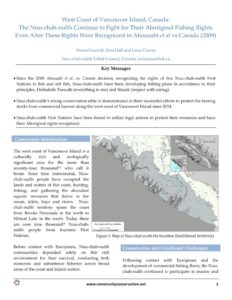
14 Dec Nuu-chah-nulth Territory, Canada
Dawn Foxcroft, Don Hall and Lissa Cowan Nuu-chah-nulth Tribal Council, Canada; info@uuathluk.ca
Key Messages
* Since the 2009 Ahousaht et al. vs. Canada decision, recognizing the rights of five Nuu-chah-nulth First Nations to fish and sell fish, Nuu-chah-nulth have been developing fishing plans in accordance to their principles, Hishukish Tsawalk (everything is one) and ?iisaak (respect with caring).
* Nuu-chah-nulth’s strong conservation ethic is demonstrated in their successful efforts to protect the herring stocks from commercial harvest along the west coast of Vancouver Island since 2014.
* Nuu-chah-nulth First Nations have been forced to utilize legal actions to protect their resources and
Community Introduction
The west coast of Vancouver Island is a culturally rich and ecologically significant area for the more than seventy-four thousand(1) who call it home. Since time immemorial, Nuu-chah-nulth people have occupied the lands and waters of this coast, hunting, fishing, and gathering the abundant aquatic resources that thrive in the ocean, inlets, bays and rivers. Nuu-chah-nulth territory spans the coast from Brooks Peninsula in the north to Nitinat Lake in the south. Today there are over nine thousand(2) Nuu-chah-nulth people from fourteen First Nations. Before contact with Europeans, Nuu-chah-nulth communities depended solely on this rich environment for their survival, conducting both economic and subsistence fisheries across broad areas of the coast and inland waters.
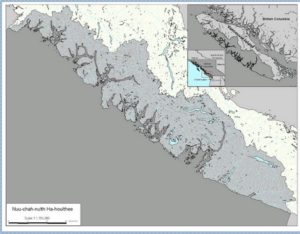
Figure 1: Map of Nuu-chah-nulth Ha-houlthee (traditional territory)
Conservation and Livelihood Challenges
Following contact with Europeans and the development of commercial fishing fleets, the Nuu-chah-nulth continued to participate in marine and freshwater fisheries. In some communities, as many as 90% of the men fished for their livelihood(3). However, devastating events contributed to a shift in this way of life, severing the relationship between the Nuu-chah-nulth people and their aquatic resources. Significant among these events were Canadian fisheries policies and regulations that diminished and excluded Nuu-chah-nulth participation in Vancouver Island’s west coast fisheries. Today, in most Nuu-chah-nulth communities, only a handful of fishers remain – although as will be described below, Nuu-chah-nulth efforts continue to reverse this situation and to restore fishing as an important part of their economies.
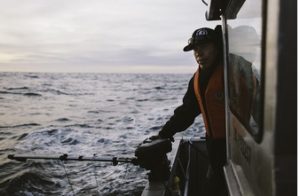
Figure 2: One of the T’aaq-wiihak fishers on the water.
Ahousaht et al vs. Canada
In June of 2003, Nuu-chah-nulth Nations filed a Writ of Summons against Canada and British Columbia seeking recognition of their Aboriginal fishing rights. The trial began in 2006, and included testimony from expert witnesses including Shawn Atleo, former National Chief of the Assembly of First Nations, anthropologists, former staff of Fisheries and Oceans Canada (DFO), and Nuu-chah-nulth fishers and knowledge holders.
The case was argued that Nuu-chah-nulth have Aboriginal rights to fish and sell fish by their preferred means and in their preferred locations, because fishing provided an economic basis for their communities before contact with Europeans. On November 3, 2009, after 123 days of trial and many months of deliberation, the BC Supreme Court issued its judgment, saying, “At contact, the Nuu-chah-nulth were overwhelmingly a fishing people. They depended almost entirely on their harvest of the resources of the ocean and rivers to sustain themselves.” The decision added that Nuu-chah-nulth people were able to prove a long history of trading and selling fisheries resources, and that this translated into a modern right to “fish and sell all species of fish in their territories.” Through this decision, Ahousaht et al vs. Canada (2009), Nuu-chah-nulth Nations established Aboriginal rights to harvest any species of fish (other than geoduck) from their territories and to sell that fish in the commercial marketplace.
The five First Nations involved in that court decision have been developing fishing plans since 2009. For more than six years, the Nations have submitted these plans to DFO as a part of negotiation efforts toward a Nuu-chah-nulth fishery based on aboriginal rights (referred to as a rights-based fishery). In addition to reflecting Nuu-chah-nulth values, the fishing plans would benefit coastal communities by providing employment, a local source of seafood for consumers, and much needed new revenue into the local economy. Unfortunately, DFO has not accepted Nuu-chah-nulth plans for sustainable, community-based fisheries and has instead offered minimal access, largely through existing commercial fishing regulations and policies. These are the same regulations and policies that the Courts found had cumulatively infringed Nuu-chah-nulth rights. They are also the same regulations and policies which have contributed to the current state of depleted ocean resources.
Community Initiative
Today, the five Nations are negotiating with Canada to design Aboriginal rights-based fisheries that exemplify conservation in their design; they are small-scale fisheries, not heavily capitalized or intensive industrial fisheries. The negotiating body is called T’aaq-wiihak, which means “fishing with the permission of the Ha’wiih (hereditary Chiefs).” Through this body, negotiators are working to reinstate Ha’wiih as decision makers and rights holders in their ha-houlthee (traditional territories). Nuu-chah-nulth Ha’wiih and leaders continue to exemplify a conservation ethic through recommendations and requests to DFO. This is seen clearly through the efforts of Nuu-chah-nulth Nations toward rebuilding herring on the west coast of Vancouver Island. To this end, the Nations proactively met with DFO to recommend strategies, including maintaining closures to commercial gill net and seine herring fisheries.
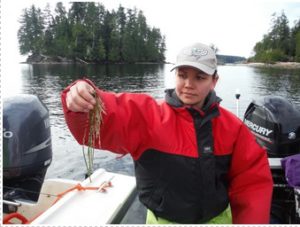
Figure 3: Ua-a-thluk Associate Biologist, Sabrina Crowley, shows the thin layer of herring roe during Herring Assessment Training, Barkley Sound.
Unfortunately, in 2014, DFO chose not to implement this recommendation and instead allowed a 10% harvest. In response, Nuu-chah-nulth Nations wrote to the fishing industry urging fishers not to fish for herring on the west coast of Vancouver Island. The Nations called for a meeting with Canada’s Fisheries Minister to discuss their concerns. Ultimately, it was an injunction successfully obtained by five Nuu-chah-nulth Nations that stopped the commercial harvest of herring along the west coast of Vancouver Island for the 2014 season.
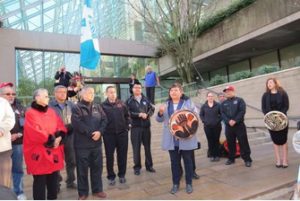
Figure 4: Nuu-chah-nulth Nations, host Nations and supporters gather on the steps of Vancouver Law Courts for song, prayer and a few words on the first day of the Justification trial (Ahousaht et al), March, 2015.
In 2015, still seeing a persistent lack of herring, Nuu-chah-nulth Ha’wiih and leaders again advised DFO not to open a commercial herring fishery in their Ha-houlthee for the 2015 fishing season. However, DFO and the commercial herring industry chose an adversarial path like that of the previous year. The Nations again went to court but were unsuccessful in obtaining an injunction, so the herring fishery took place. However, as has been predicted by Nuu-chah-nulth knowledge holders, the herring remained in low abundance and the few commercial herring vessels that came to Nuu-chah-nulth territories to fish left with their holds empty.
Prior to the 2016 herring season, Nuu-chah-nulth Nations and the commercial herring industry reached an agreement through a Letter of Understanding to not fish the west coast of Vancouver Island. This letter of Understanding was presented to the new Fisheries Minister and the Minister eventually agreed to the no-fishing recommendation of the Nations and industry. Nuu-chah-nulth Nations continue to encourage DFO and industry to work collectively on a Herring Rebuilding and Management Framework with long term fishery objectives that all parties can support.
Practical Outcomes
Although the Ahousaht decision has not been implemented fully due to stalling from Canada’s government, the Nuu-chah-nulth are still seeing positive results of rights-based community fisheries from the five T’aaq-wiihak Nations that, since the court decision, have been selling sustainably caught suuḥaa (chinook salmon), caʔinwa (gooseneck barnacles) and p̓uuʔi (halibut) on Vancouver Island’s west coast. Ha’oom, the Nations’ wild seafood brand, is recommended “ocean friendly” by Ocean Wise, and is purchased by conscientious consumers that are mindful of local and global conservation issues.
The Nuu-chah-nulth Ahousaht decision, once implemented to its full extent, will allow the Nuu-chah-nulth, who have protected and harvested on the west coast of Vancouver Island for thousands of years, to strengthen their relationships with these resources. The result will be increased economic opportunities not only for Nuu-chah-nulth communities but also for neighbouring coastal communities. The Nuu-chah-nulth, along with communities in remote coastal areas, are reliant on the ocean for food and transportation. Being a constant watchful eye along the coast, Nuu-chah-nulth elders, fishers, and leadership have an important role in monitoring the ocean resources. Despite this, Nuu-chah-nulth Nations have found that the Canadian government, with Federal management authority over the ocean resources, has not always valued the requests and advice from Nuu-chah-nulth communities.
However, the success of 2016, when the Canadian Federal government agreed not to open the commercial herring fishery, is seen by Nuu-chah-nulth and other coastal Nations as a sign of change from the Canadian government. There is hope of coming closer to the goal of the government acknowledging the authority of Nuu-chah-nulth Ha’wiih and leadership over the resources within their territories, and working collaboratively with Nuu-chah-nulth communities to develop sustainable relationships valuing conservation and livelihoods with their shared sea resources.
References
BCStats. 2013. Sub Population Estimates (used population amounts for Alberni Clayoquot and Strathcona). Accessed December 5, 2016 from: http://www.bcstats.gov.bc.ca/StatisticsBySubject/Demography/PopulationEstimates.aspx
British Columbia. 2014. First Nation Negotiations. Accessed December 5, 2016 from: http://www.gov.bc.ca/arr/firstnation/nuu_chah_nulth/default.html
Benson Nookemis. 2008. Benson Nookemis testimony from Ahousaht et al. vs. Canada, June 12, 2008.
A short documentary on fishing rights and traditional livelihoods among the Nuu-chah-nulth First Nations.



